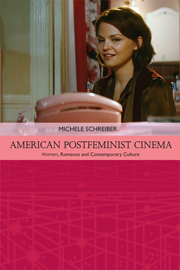Book contents
- Frontmatter
- Contents
- Acknowledgments
- List of Illustrations
- Introduction: Women, Postfeminism and Romance
- 1 ‘Both Glad and Sorry’: Romance Cycles and Women's Politics
- 2 Pragmatism vs. Sentimentality: Amelioration in the Postfeminist Cycle
- 3 Past vs. Present: Temporality in the Postfeminist Cycle
- 4 Sexy vs. Funny: Sexuality in the Postfeminist Cycle
- 5 Independence vs. Dependence: Economics in the Postfeminist Cycle
- Conclusion: Beginnings vs. Endings: the Future of the Postfeminist Cycle
- Selected Bibliography
- Index
2 - Pragmatism vs. Sentimentality: Amelioration in the Postfeminist Cycle
Published online by Cambridge University Press: 05 September 2014
- Frontmatter
- Contents
- Acknowledgments
- List of Illustrations
- Introduction: Women, Postfeminism and Romance
- 1 ‘Both Glad and Sorry’: Romance Cycles and Women's Politics
- 2 Pragmatism vs. Sentimentality: Amelioration in the Postfeminist Cycle
- 3 Past vs. Present: Temporality in the Postfeminist Cycle
- 4 Sexy vs. Funny: Sexuality in the Postfeminist Cycle
- 5 Independence vs. Dependence: Economics in the Postfeminist Cycle
- Conclusion: Beginnings vs. Endings: the Future of the Postfeminist Cycle
- Selected Bibliography
- Index
Summary
To get a snapshot of the function of film in the contemporary cultural conversation about women's relationships consider the following 2012 story featured on the feminist website Jezebel, entitled ‘Meet the so-called nice guys of OK Cupid.’ The story discusses a Tumblr blog created by a disenchanted female user of the online dating site OK Cupid that superimposes innocuous quotes from men's dating profiles over their pictures, highlighting the juxtaposition of words and visuals. Both the original Tumblr site, and the Jezebel story about it, suggest that men disingenuously describe themselves as ‘nice guys’ on their online dating profiles to play on a recurring trope in the romance genre wherein the nice but boring male friend character is overlooked by the female protagonist, only to be revealed be her best love match at the end of the film. In other words, the two sites contend that the OK Cupid men are adopting vocabulary and conjuring archetypal representations from oft-seen romantic films as a tool to persuade potential female love interests that they are the ideal mate.
A female reader with the screen name rokokobang responded to the Jezebel story in the following way:
Maybe I'm crazy, but I feel like women are actually bombarded with the whole ‘The nice nerdy quiet shy guy right in front of you – HE’'S the one you should be with!!!’ via movies and television. I know I always felt this way growing up, and it led me to stay in a super shitty relationship with a guy because he had me convinced he was the nice nerd, when in fact he treated me like shiiiiiit. But I had known him since we were little! We were good friends! He wasn’t the popular guy, he was a film geek! He MUST be the guy I’m supposed to be with!! Maybe I’m just way more susceptible to movies and TV than most people …
- Type
- Chapter
- Information
- American Postfeminist CinemaWomen, Romance and Contemporary Culture, pp. 55 - 82Publisher: Edinburgh University PressPrint publication year: 2014



